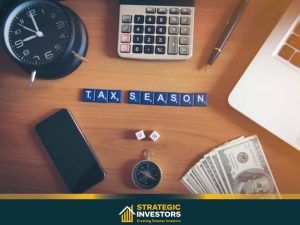
Why buy a property investment? During the height of the dot-com share market boom, alleged investment experts scoffed at the property as an investment. The word property was an old economy investment, not expected to generate good returns in the 21st century compared with the profits from so-called new economy investments. We now know that the share price of some of those new economy companies went sky high for a short time, but most came crashing back down to earth.
Many of these dot-com companies now are bankrupt, and shareholders lost everything. With the dot-com boom turning into the dot-bomb, people now recognise physical assets such as property having advantages that aren’t available with shares and other investments. Let’s consider some of the benefits.
Is Property Investment worthwhile?
 Property is something you can touch and see. If an investor can drive past the asset and physically see it, it provides a sense of security. Houses can’t be stolen from under owners’ noses, like company funds can be stolen from shareholders. The property offers a regular income stream, usually monthly. An investor can make plans about the income he or she can reasonably expect to receive in the future, whereas shares usually only pay dividends twice a year. Dividends can also fluctuate more widely than rental income, depending upon the company’s underlying business state. So, where you may be able to plan on receiving $450 a week on rental income, or $11,700 each half-year when receiving dividends, you may receive $3,000, one half and only $1,500 the next is dividends from shares are not predictable.
Property is something you can touch and see. If an investor can drive past the asset and physically see it, it provides a sense of security. Houses can’t be stolen from under owners’ noses, like company funds can be stolen from shareholders. The property offers a regular income stream, usually monthly. An investor can make plans about the income he or she can reasonably expect to receive in the future, whereas shares usually only pay dividends twice a year. Dividends can also fluctuate more widely than rental income, depending upon the company’s underlying business state. So, where you may be able to plan on receiving $450 a week on rental income, or $11,700 each half-year when receiving dividends, you may receive $3,000, one half and only $1,500 the next is dividends from shares are not predictable.
Take Control
 Another thing property allows you is the ability to control what’s happening with your investment. What sort of influence do you think small shareholders have over a company’s future directions? Unless you are a major institution or major shareholder, you have no real influence over the running of a company. How often do you see headlines about companies going broke due to poor or deceitful management? When you purchase property, the decision making is entirely up to you. You can choose the rental price and determine when or if you complete renovations and alterations. The complete control of the property lies with you.
Another thing property allows you is the ability to control what’s happening with your investment. What sort of influence do you think small shareholders have over a company’s future directions? Unless you are a major institution or major shareholder, you have no real influence over the running of a company. How often do you see headlines about companies going broke due to poor or deceitful management? When you purchase property, the decision making is entirely up to you. You can choose the rental price and determine when or if you complete renovations and alterations. The complete control of the property lies with you.
Good Leveraging
A further reason to invest in property is that the ability to add value to it rests entirely with you. If you buy shares, you don’t have an opportunity to add value unless you are elected to the board of directors. But when you buy property, you have the opportunity to add value to your asset in several ways. For example, you can add value by renovating the property.
An additional reason to invest in property is your ability to leverage your asset. Banks and other financial institutions love property and are much more willing to loan money when the property is available as collateral. This is because property can’t disappear. It is fixed and immovable. It is also relatively stable in value. Because of the relative price stability and immovability, financiers are willing and able to lend to a high proportion of the property’s value. In some instances, you can borrow up to 90% or more of the value of your property.
Investing in property also means relative price stability. There isn’t a market price quoted each day on each piece of property. While the market values do fluctuate slightly from week to week, it’s not reflected publicly in prices. Generally, investors and financiers consider properties stable in price, whereas shares, even the blue-chip ones, can vary in price by 30% or more in the space of one year.

Can property survive inflation?
 The property allows you to protect yourself against inflation. It has probably been the asset that has been the best hedge against inflation over time. Just like any product, the price of a property depends on supply and demand. When inflation is high, wages and income tend to go up at a similar rate to inflation. This encourages higher demand for property as people have more income with which to buy. It’s the demand for more properties that causes prices to rise, not the actual inflation. The close connection between rising inflation and rising income has led to the property becoming a hedge against inflation.
The property allows you to protect yourself against inflation. It has probably been the asset that has been the best hedge against inflation over time. Just like any product, the price of a property depends on supply and demand. When inflation is high, wages and income tend to go up at a similar rate to inflation. This encourages higher demand for property as people have more income with which to buy. It’s the demand for more properties that causes prices to rise, not the actual inflation. The close connection between rising inflation and rising income has led to the property becoming a hedge against inflation.
The tax benefits of buying property are well known but often misunderstood. Most people will have heard about negative gearing, but few understand the full tax benefits available when you invest in property. Negative gearing is available for both property and stock market investments. However, the best tax benefit from owning property, which isn’t known for shares or other investments, is that you can deduct non-cash expenses. For example, appreciating items of plant and equipment such as the building itself, items such as dishwashers, air conditioning units, etc., even if you haven’t bought them individually but just purchased them with the property. If you don’t have depreciation allowances, you will declare the total income and expenses to the Taxation Office (ATO), showing a net property income of AUD $2,000.
For example, if you had a property that bought an income of $20,000 with cash expenses of $18,000, interest rates, tax, etc., you would technically be $2,000 better off from a cash flow perspective, ignoring the very significant capital growth for this purpose. About half the income would be taxed, and you’d end up with around AUD $1,000 left after tax. But suppose you had depreciable allowances such as carpets, window trimmings, appliances, etc.. In that case, the ATO allows you to deduct a percentage of the value of certain items of plant and equipment from your tax bill, resulting in much more money in your pocket. Many investors have properties that create a positive cash flow, but they pay little or no tax on the income due to deducting the non-cash items.
Take Advantage of Tax Breaks
 One of the greatest benefits of investment in general, which is particularly applicable to property investment, is using any gains achieved as collateral for further investment. Capital gains were tax-free until 1995 in Australia. Now, gains realised on investments purchased after September 1985 are taxed. More recent legislation has reduced the amount of capital gains tax for individuals providing they keep the investment for a year or more. One of Australia’s best features of the capital gains tax system is that you aren’t taxed until the gain is realised. The ATO doesn’t make you revalue the investment each year and pay tax on the unrealised gain. If you hold the property forever, then you never pay the capital gains tax. As your property increases in value, you can approach your financier with the new valuation, and they’ll be more than happy to loan you a large proportion of the increased amount.
One of the greatest benefits of investment in general, which is particularly applicable to property investment, is using any gains achieved as collateral for further investment. Capital gains were tax-free until 1995 in Australia. Now, gains realised on investments purchased after September 1985 are taxed. More recent legislation has reduced the amount of capital gains tax for individuals providing they keep the investment for a year or more. One of Australia’s best features of the capital gains tax system is that you aren’t taxed until the gain is realised. The ATO doesn’t make you revalue the investment each year and pay tax on the unrealised gain. If you hold the property forever, then you never pay the capital gains tax. As your property increases in value, you can approach your financier with the new valuation, and they’ll be more than happy to loan you a large proportion of the increased amount.













